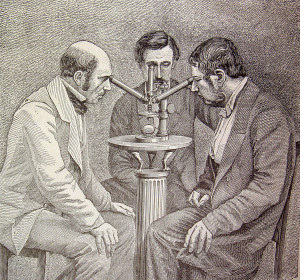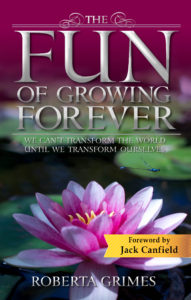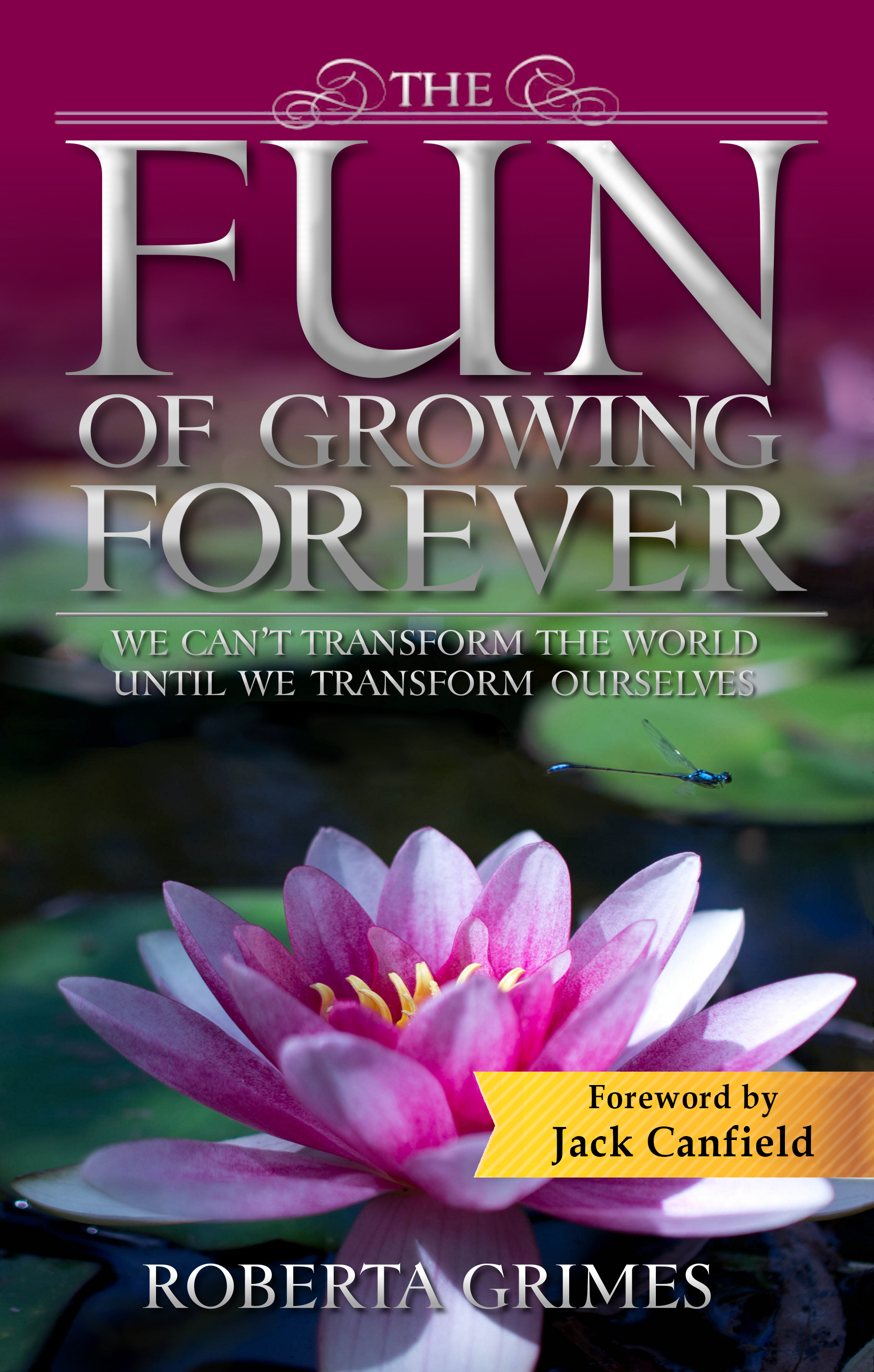 Among my earliest memories is the fun of helping my grandmother gather eggs. I was at eye-level with her geese, and they would chase me if they were out so she would shut them in the barn, where they would honk and complain. I was a little bigger than the chickens, so while Grandma collected their eggs I would distract the mommies by chasing them.
Among my earliest memories is the fun of helping my grandmother gather eggs. I was at eye-level with her geese, and they would chase me if they were out so she would shut them in the barn, where they would honk and complain. I was a little bigger than the chickens, so while Grandma collected their eggs I would distract the mommies by chasing them.
It was there in my grandmother’s chicken-yard that I got my first lesson in cruelty. A few of her hens had big, full tails. Some had skimpy tails, some had no tails at all, and one or two had been pecked so much that their whole hind-ends were bare. Occasionally my grandmother would do the most hen-pecked of her hens a favor by making her into a Sunday dinner, but she told me there was nothing else she could do. Chickens have a pecking-order. That is just the way it is.
Of course, chickens know no better. Chickens don’t enter their lifetimes on earth with a specific intention to learn and grow spiritually. They have no great teachers, no ideals or aspirations, no capacity to feel compassion, really nothing at all to balance that instinctive need to cruelly dominate others. For you and me, of course, it is another matter! And the fact that so many people really have not grown beyond the chicken-yard in their capacity to live with other people is a big reason why the consciousness vibratory rate of humankind has fallen so low. This planet is in crisis now. Unless we will fairly rapidly work to raise the consciousness vibration of humankind away from fear and hatred and toward ever more perfect love, we are told by those that we used to think were dead that before long there will be nothing left of this species that once dominated the earth beyond remnants battling on a ruined planet.
 Pecking orders are just as usual for people as they are for hens. I recall that this nonsense happened in every grade of school, so by the third grade I was ignoring my schoolmates. I refused to join either the bullies or the bullied, and I couldn’t stop what they were doing so it carried on without me. My high school experience was better, perhaps because there were cliques that largely kept to themselves: I wasn’t athlete-cheerleader or ethnic townie, but I fit with the college-bound just fine. I pursued my own interests in college and law school, making friends among like-minded people, and by early adulthood I was sure that witnessing barnyard-level cruelty was happily just a part of my past.
Pecking orders are just as usual for people as they are for hens. I recall that this nonsense happened in every grade of school, so by the third grade I was ignoring my schoolmates. I refused to join either the bullies or the bullied, and I couldn’t stop what they were doing so it carried on without me. My high school experience was better, perhaps because there were cliques that largely kept to themselves: I wasn’t athlete-cheerleader or ethnic townie, but I fit with the college-bound just fine. I pursued my own interests in college and law school, making friends among like-minded people, and by early adulthood I was sure that witnessing barnyard-level cruelty was happily just a part of my past.
But sadly, as you know, the advent of the Internet has brought human cruelty to hideous new levels! It affects both children and adults, to the point where the government has become involved. And our civic and political life is a battlefield! Most modern politicians even would rather make vicious personal attacks on one another than engage in substantive debates. What especially gets me is the glee with which so many of these battlers will put down, humiliate, beat up, and try to destroy other people who just have different opinions. Thanks largely to heroes like Dr. Martin Luther King, Jr., the racial issues that fifty years ago were tearing this nation apart are mercifully becoming a thing of the past; but apparently even that improvement is a problem for a lot of people! Many are so eager to continue battling over race just for the sake of battling that today more than two-thirds of reported racial hate crimes turn out to be hoaxes. Next week I will share with you some early signs that perhaps our civic life can be improved, but for now there is rampant cruelty nationwide over what are just political disagreements on a scale that my younger self could not have imagined. The United States has become little more than my grandmother’s chicken-yard writ large!
Helping our society to rise above living at the social level of laying hens is a deeply urgent matter now.
deeply urgent matter now.
What got me thinking about this general need that some people feel to be cruel to others was an email I received last week. This website gains new subscribers daily, and of course people also unsubscribe. Our subscribers receive new blog posts attached to an email that begins with the words, “Don’t Miss Roberta’s Latest Post…. ” So one woman who received such an email chose to hit “Reply” and type, “Don’t worry, I won’t. Thank you.”
I try to answer every email. When I came to hers, I said something about the fact that there are many ways to grow spiritually, if she continues to seek I am sure she will find, and I wished her well. Then I put her out of my mind, but insidiously her words kept coming back. In my own life, I try to avoid giving anyone any reason for sadness; and feeling as I do, I struggled to understand that woman’s motivation. What must be in the mind of someone who cannot simply unsubscribe, but who needs to take a swipe on her way out with the hope of ruining a stranger’s day? What made it worse was the fact that she hadn’t seemed to act from anger. No, for her being cruel was what it had been for my grandmother’s hens and for my grade-school classes, and what it is now in our civic arena: it was a weapon of self-aggrandizement. Indeed, what she did seemed less excusable than the cruelty of those high-ranking hens, since at least they lived in a peck-or-be-pecked world! I have since come to see the moment last week when I saw someone try to make a stranger unhappy as a microcosm of what we must battle if we are ever to have any hope of raising the vibration of this planet’s population and thereby saving and transforming the world.
 Enjoying being cruel to other people has long been a part of the human condition. It cannot be genetic, hard-wired or innate, because our minds are of the same consciousness as the Godhead; but rather, it seems to be more like the pecking-order that hens establish. It is a byproduct of the stress that results from our living in such close proximity to one another.
Enjoying being cruel to other people has long been a part of the human condition. It cannot be genetic, hard-wired or innate, because our minds are of the same consciousness as the Godhead; but rather, it seems to be more like the pecking-order that hens establish. It is a byproduct of the stress that results from our living in such close proximity to one another.
Jesus talks about neither cruelty nor kindness in the Gospels, beyond saying variations of “Treat others the same way you want them to treat you” (LK 6:31). He seems to have seen cruelty as something He didn’t need to address directly, since once sufficient numbers had applied His core teaching that we must love other people as we love ourselves, we would be living at a sufficiently high level of consciousness that cruelty would fade away.
So what I am wondering now is whether our addressing cruelty proactively might be yet another way for us to work to raise the consciousness vibration of this planet?
The opposite of cruelty is kindness. If we work to train ourselves to manifest kindness in every situation, might our doing that act in our lives very much as an active gratitude practice does, and soften our minds, making it easier for us to better learn forgiveness and perfect love?
Always choosing kindness is easy. And it quickly becomes a habit that works beautifully with our efforts to learn forgiveness and love! In every situation we must:
- Learn to see everyone as a perfect aspect of the Godhead. It’s a simple matter of reinforcing what we already know is true, until we cannot look at any human being without seeing an aspect of the divine. Panhandlers, members of
 criminal gangs, even people who treat us horribly: all of them are sacred eternal beings. Or as Mother Teresa said, “Each one of them is Jesus in disguise.”
criminal gangs, even people who treat us horribly: all of them are sacred eternal beings. Or as Mother Teresa said, “Each one of them is Jesus in disguise.” - Learn to treat yourself with kindness. We can become so caught up in trying to do more for others that we neglect to nurture our own happiness! What I learned to do early on was to build into each day a few small things that I personally enjoyed. Really small things. Treats. As the beloved Buddhist nun Pema Chodron said, “Compassion for others begins with kindness for ourselves.”
- Firmly squelch every impulse toward cruelty. And these impulses come up all day long! Especially when someone seems to you to richly deserve bad treatment, you must never gloat at another’s comeuppance. Never say or do anything that will make someone sad, and be especially careful about this when it is your personal view that a little bad treatment might in this case be deserved. Mark Twain said, “Forgiveness is the fragrance the violet sheds on the heel that has crushed it.” I love that thought! Please God, in all things may I be that fragrance.
- Look for instances where you can be proactively kind. It soon will seem to you that it isn’t enough for you just to avoid being cruel. And coming up with ways to make strangers happy is a wonderful way to rev your kindness engine! I have been at this for so long now that it is automatic: I look for chances to say something sincerely kind to every stranger I encounter, and the more I do that the happier I am.
My dear friends, this is an easy one! It’s like cleaning up your living room. You can develop a habit of kindness in only a few months of modest effort, and you will find that it pairs very well with your attitude of gratitude to make of your mind a much happier and a more deeply peaceful personal haven. It also makes your learning to better forgive and love just a natural progression! When Jesus said, “A new  commandment I give to you, that you love one another, even as I have loved you, that you also love one another” (JN 13:34), He was telling us it was time for humanity to stop interacting at the level of the chicken-yard, and at last claim the universal love and joy that always has been our birthright.
commandment I give to you, that you love one another, even as I have loved you, that you also love one another” (JN 13:34), He was telling us it was time for humanity to stop interacting at the level of the chicken-yard, and at last claim the universal love and joy that always has been our birthright.































































